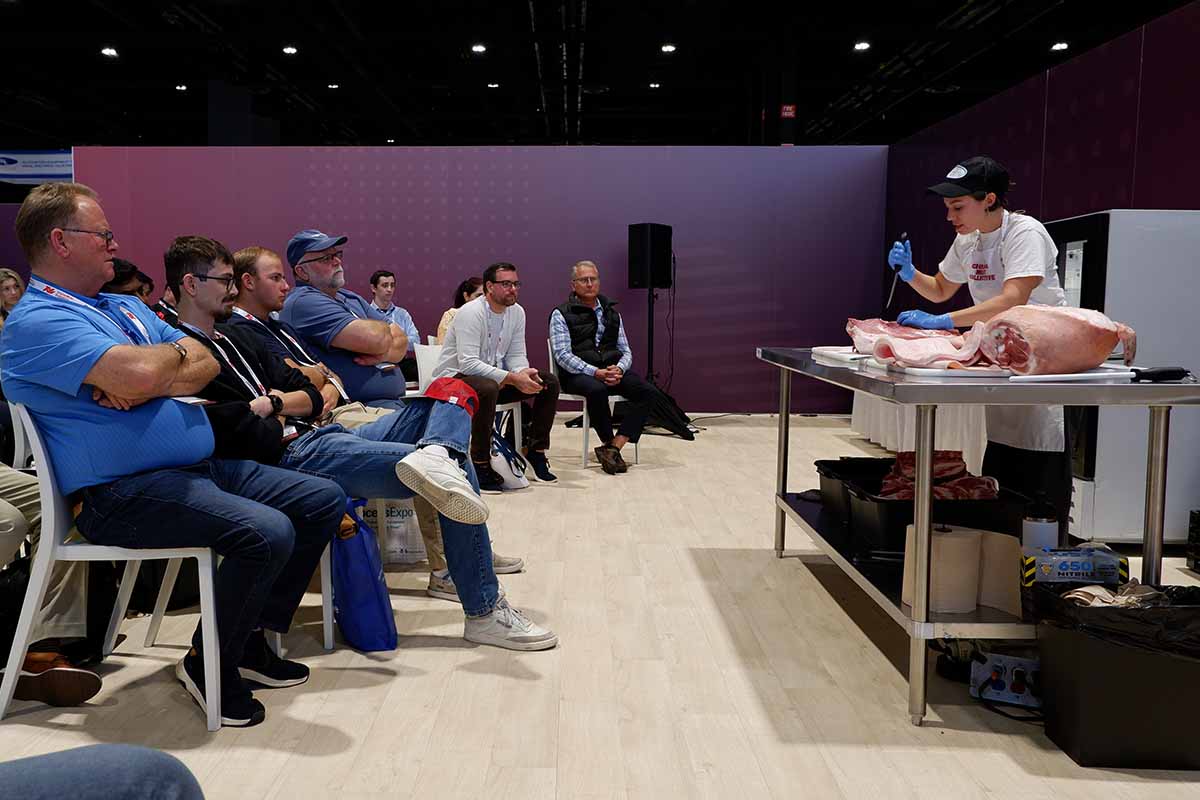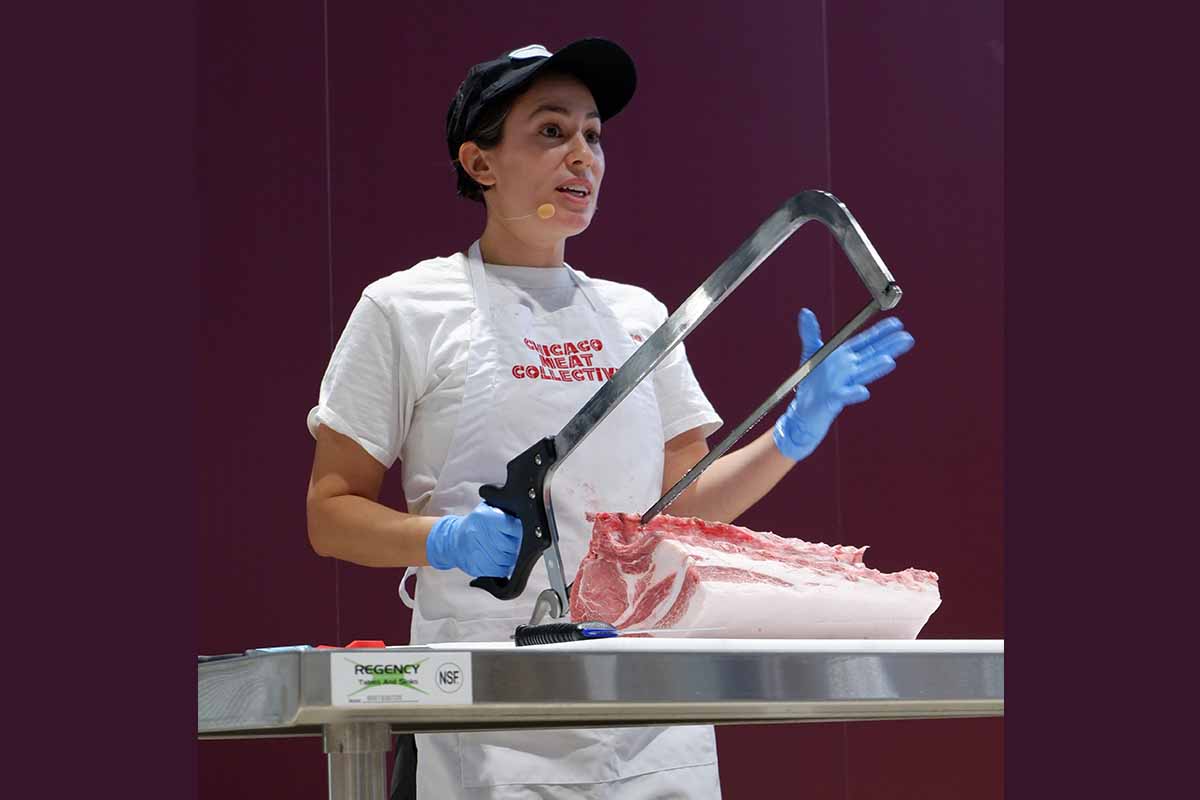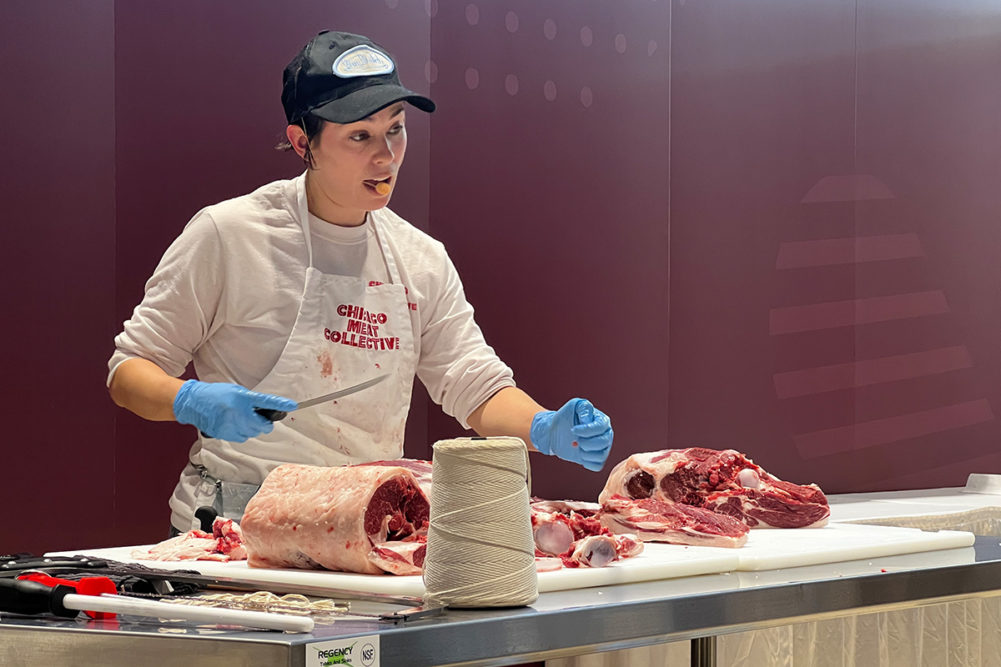McCullough Kelly-Willis helps get home cooks elbow-deep in meat. As the founder of Chicago Meat Collective, she teaches consumers how to buy whole animals by themselves, get it home and break down the animal. Kelly-Willis treated attendees of Process Expo 2023 — now called the Equipment And Technology Show for Food & Beverage (EATS) — at McCormick Place, Chicago, to a live demonstration of her skills as a butcher and chef, while sharing the story of Chicago Meat Collective and the Meat Collective movement.
“I think it’s very cool to be able to do whole animal butchery — muscle by muscle, cut by cut breakdown of a whole animal — in a setting like this that’s all about scale and efficiency and new tech,” she said before launching into a demonstration. “This is very much the Old World way of doing things, so I just feel like it’s quite an honor to be able to be here presenting some of those things because at the end of the day, that’s still the basis for meat processing, and these are really important skills. So, it’s just fun to be able to show them to a big audience, and I’m hoping people find inspiration in it even if they’re working way further down the supply chain.”
New school, Old World skills
Camas Davis developed the Meat Collective model in 2010, while living in Portland, Ore. It started as the Portland Meat Collective offering butchery classes that produced a lot of meat. That’s where the meat buying component came in — consumers buying whole animals directly from producers instead of cuts.
Davis went on to launch the Good Meat Project, a non-profit with a mission to inspire responsible meat production and consumption through hands-on education. Another goal of the program is to establish the Meat Collective model in more cities. Kelly-Willis launched the Chicago Meat Collective with help from the Good Meat Project, and today, the program is its own business entity that offers hands-on butchery and cooking classes in addition to lessons in charcuterie production.
Kelly-Willis began her journey in butchery at Reed College, a private liberal arts school in Portland, where she was exposed to sustainable meat production concepts. Later, she signed up for a pig butchery class with the Portland Meat Collective and found her calling. She would continue her education at Local Foods and Butcher & Larder, a Chicago-based whole animal butcher shop and retail market that sources pasture raised, antibiotic and GMO-free meats sourced from farms across Illinois. The retail business closed after eight years in operation; the wholesale business continues.
 Source: Erica Shaffer/Sosland Publishing Company
Source: Erica Shaffer/Sosland Publishing CompanyConsumer confidence
Kelly-Willis said it’s a pleasure working with home cooks and consumers because they represent the end of the farm-to-fork chain.
“The wonderful thing about the Chicago Meat Collective clientele is that they’re a little bit self-selecting — it’s an intensive class that I teach. It’s a whole afternoon; it’s hands on; it’s over $200, so people participate because something in them wants to get more in touch with where their food comes from,” she explained. “I’ve found that there’s a lot of different reasons that people come to our classes. But across the board, I think the experience that’s valuable about doing hands-on butchery classes is that when people really have that physical experience of seeing the whole animal and working with it with their hands, something just clicks and it’s a little bit different for everyone.”
But what consumers at the Meat Collective classes share, she said, is a desire to understand more about the sources of their meat. Industry research into consumer meat buying trends echoes this observation.
“Personal health, animal welfare, concern for the planet and social responsibility affect the food and meat/poultry choices of many Americans who eat meat, fueling an interest in transparency,” according to the 2023 Power of Meat report. “When buying meat/poultry, 62% are looking for products that are better for their health, and about one-third consider animal welfare, the planet and social responsibility.”
And research from Midan Marketing indicates the trend will persist into the new year. In its 2024 Top Trends To Watch blog, Midan said, “Sustainability is a multilayered initiative whose definition will continue to evolve; right now, regenerative agriculture is what’s getting a lot of buzz within the meat space. For some consumers, simply doing what’s right for the earth, for the animals and for people is the essence of sustainability — and younger consumers like Gen Zs and some Millennials now expect those values to be foundational to a brand.”
The Chicago Meat Collective serves as a resource connecting consumers with local ranchers and farmers that utilize humane animal husbandry and sustainable farming practices.
“I think people walk away from it having a greater respect for the complexity of the food chain, the supply chain,” Kelly-Willis said of the program’s impact. “I think it also gets people excited about sourcing better meat.”
 Source: Erica Shaffer/Sosland Publishing Company
Source: Erica Shaffer/Sosland Publishing CompanyLive demo show
Kelly-Willis worked closely with Process Expo show organizers to determine what would give attendees the best experience. For her sessions, she chose pork, lamb and a sausage making demonstration.
“I love working with hogs,” Kelly-Willis said. “They’re a versatile animal, they’re very easy to use in a nose-to-tail way. It’s also the flagship class of the Chicago Meat Collective — a whole hog butchery class. So, I knew I wanted to start with that.”
The lamb she chose for the demonstration was a bit on the heavy side at 100 lbs. Kelly-Willis chose lamb for several reasons.
“Lamb is one of my absolute favorites to break down,” she said. “It’s very cool because you get to see the whole animal with the head on. It’s not split down the spine at the processors, so it is actually quite distinct from the way the hog looked on the table. So, it will give me an opportunity to talk through some other skill sets.
“And lamb is a little underappreciated, unlike beef,” she added. “So, it does give me an opportunity to hype up lamb and why it’s so great.”
An aspect of getting consumers on board with whole animal butchery is the opportunity available to butchers to explain what’s going into the trash and why, and consumers will see that there’s very little meat getting thrown away, Kelly-Willis said.
“It’s important to understand a lot of the things that make a pork chop so great are so much more based on culture and culinary tradition than they are on any other element of quality,” she said. “The things that are in the trim are often marbled and tender and beautiful, they’re just not big enough to be chop; they’re not big enough to sell — they’re just little extra bits.”
Kelly-Willis said she loves whole-animal butchery, and she looks forward to another occasion to demonstrate the necessary Old World skills and suggest strategies for getting the most out of each animal that ends up on the butcher’s block.
“One element that kind of restricts — or something we had to work around is the facilities and our equipment,” Kelly-Willis said of the Process Expo 2023 venue. “So, I didn’t really want to be using a band saw on the show floor; we wanted to keep our footprint pretty light. That kind of steered us away from beef although I love teaching beef butchery.
“People respond really well to seeing beef broken down,” she said. “Maybe next time we’ll figure out some solutions for that.”



